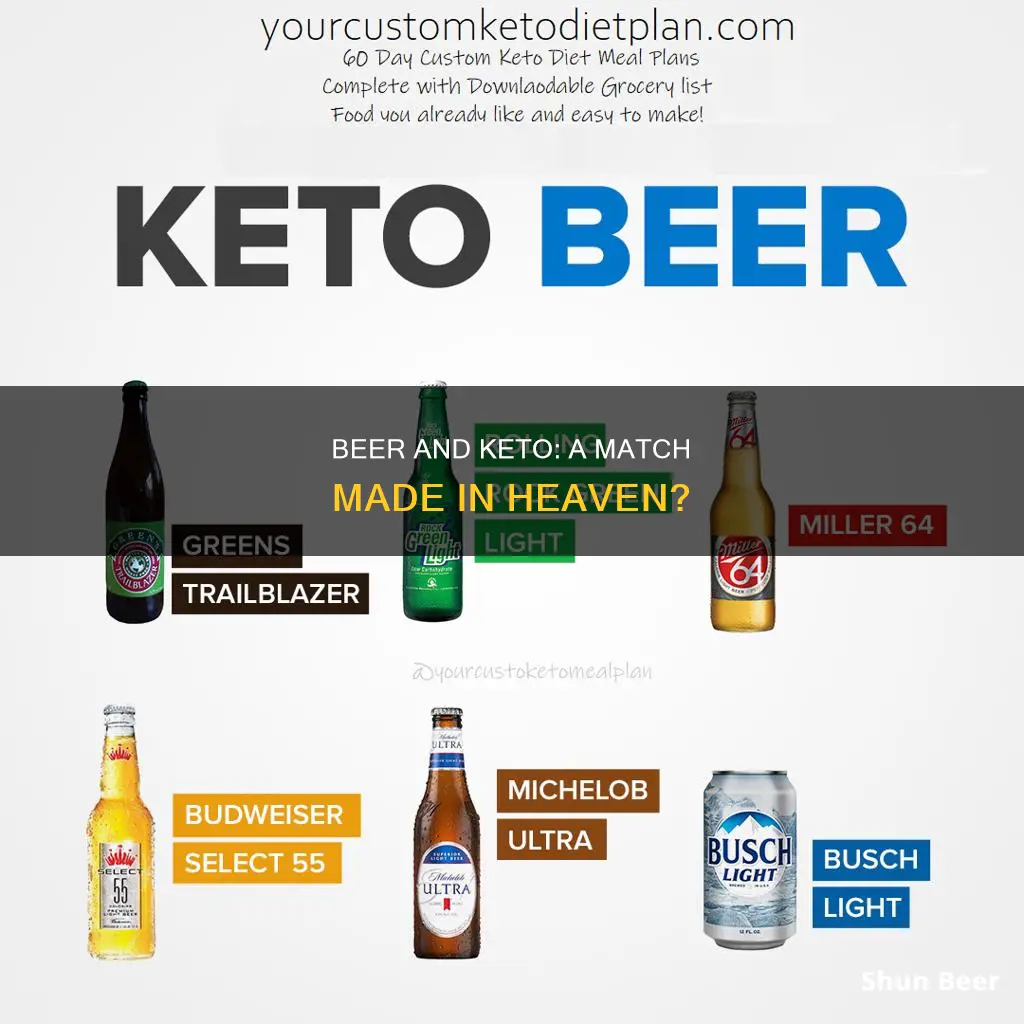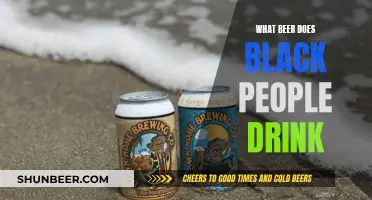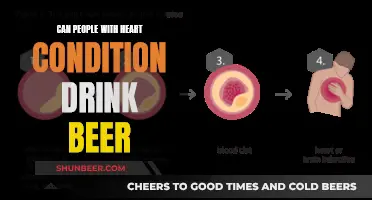
The ketogenic diet, or keto diet, is a low-carb, high-fat diet that can be tricky to navigate when it comes to drinking alcohol. While most beers are not keto-friendly due to their high carb content, there are some light and low-carb beers that can be enjoyed in moderation without completely derailing your progress. So, can you drink beer on the keto diet? The answer is a strong maybe.
What You'll Learn

Pure spirits like gin, vodka, and tequila are keto-friendly
Pure spirits such as vodka, tequila, rum, whiskey, and gin are carb-free, making them a good choice for those on the keto diet. However, it's important to be cautious with mixers. A vodka soda has zero net carbs, while a rum and coke have 22.
If you're on the keto diet, it's best to stick to low-carb mixers like diet soda, seltzer, diet tonic water, and powdered flavour packets. Regular tonic water, for example, has upwards of 25 grams of sugar per serving.
While pure spirits are a good option for those on the keto diet, it's important to remember that alcohol can slow down weight loss progress. This is because when you're on a low-carb, high-fat diet, your liver metabolism changes, and your body may use alcohol for energy instead of fat. Therefore, while an occasional drink is okay, drinking daily may slow down the fat-burning process.
In addition, alcohol is rich in "empty" calories and can increase the risk of nutritional deficiencies and weight gain over time. As such, it's important to keep alcohol intake moderate—defined as one drink per day for women and two per day for men.
Tramadol and Non-Alcoholic Beer: Safe Mix or Not?
You may want to see also

Beer is usually high-carb but some are marketed as light and low-carb
Beer is usually high in carbohydrates, which means it's not the most keto-friendly drink. A can of regular beer can contain over 12 grams of carbs, and even one beer can knock you out of ketosis and hinder your progress. However, there are some beers marketed as light and low-carb, which you can enjoy in moderation without completely sacrificing your keto diet.
Some examples of low-carb beers include Corona Premier, Bud Light Next, Miller Lite, Busch Light, and Beck's Premier Light. These beers typically have less than 5 grams of carbs per serving, and some are even completely carb-free. For instance, a Bud Light Next contains 0 grams of carbs, while a Corona Premier has only 2 grams of carbs. With such low carb content, you can occasionally indulge in these light beers without completely derailing your keto progress.
It's important to remember that the keto diet is a low-carb, high-fat diet, and the general recommendation is to consume 20 to 50 grams of carbs per day. So, if you choose to drink a light beer, be mindful of your daily carb intake and make sure to stay within your allotted carb limit. Additionally, keep in mind that alcohol can affect your judgment and willpower, making it easier to deviate from your diet.
While light and low-carb beers can be a better option for those on the keto diet, it's still important to consume them in moderation. Alcoholic beverages, even the low-carb varieties, are rich in "empty" calories and can contribute to weight gain and nutritional deficiencies over time. Therefore, it's recommended to limit your alcohol intake to one drink per day for women and two drinks per day for men.
Is Non-Alcoholic Beer Really Sober Drinking?
You may want to see also

Dry wine is another low-carb option
When it comes to sparkling wines, varieties marked with "Brut," "Extra Brut," or "Brut Nature" have the lowest amounts of residual sugar. A standard glass of California sparkling wine, for instance, has 2 grams of total and net carbs.
If you're dining out, simply ask for the driest white wine or specify that you don't want anything sweet. This will ensure you get a good low-carb option.
However, it's important to remember that alcohol can affect your judgment and willpower. Drinking can also have a more pronounced effect on your body when you're on a keto diet. Therefore, it's crucial to drink in moderation and always with a meal or snacks to keep your blood sugar balanced.
Ginger Beer: A Safe Drink for Coeliacs?
You may want to see also

Cocktails can be keto-friendly if you choose low-carb mixers
While on the keto diet, it's important to keep your carbohydrate intake low. This can be challenging when it comes to alcoholic drinks, as many are high in carbs and sugar. Beer, for example, is typically not recommended on the keto diet due to its high carbohydrate content. However, that doesn't mean you have to give up cocktails entirely. By choosing low-carb mixers and spirits, you can still enjoy a drink while staying within the keto diet guidelines.
When creating keto-friendly cocktails, opt for spirits such as gin, vodka, tequila, rum, whiskey, and brandy, as these typically have zero carbs. You can also use dry red and white wines, which are low in carbs. For mixers, stick to sugar-free and low-carb options such as soda water, seltzer, club soda, diet tonic water, and sugar-free juice. Avoid high-carb mixers like regular soda, tonic water, juice, and energy drinks.
- Vodka soda or vodka tonic: Simply mix vodka with soda water or a diet tonic water for a refreshing, low-carb drink.
- Gin and tonic: Use diet tonic water to keep the carb count low.
- Martini: A classic gin or vodka martini is a great choice as it doesn't contain any sweet ingredients.
- Mojito: Make a keto-friendly version by using a low-carb simple syrup instead of sugar.
- Margarita: A classic margarita is already slimmed down, but you can make it even more keto-friendly by replacing added sugars with natural ingredients like orange juice and agave.
- Bloody Mary: Use unsweetened tomato juice to make this cocktail low-carb.
- French 75: This fancy cocktail typically contains champagne, which is naturally low in carbs. Just be sure to use a keto-friendly simple syrup.
- Dark 'N' Stormy: Make this classic cocktail keto-friendly by using sugar-free ginger beer.
- Cosmopolitan: Swap out the Cointreau and cranberry juice for orange extract and sugar-free cranberry juice, along with your preferred sweetener.
Remember, even though these cocktails are keto-friendly, it's important to consume them in moderation. Alcoholic drinks are high in "empty" calories and can contribute to weight gain and nutritional deficiencies over time. Additionally, alcohol can affect your judgment and willpower, making it harder to stick to your keto diet.
Beer and Sore Throats: A Risky Relief?
You may want to see also

Alcohol can slow down weight loss progress
Empty Calories
Alcoholic drinks are often referred to as “empty” calories. This means that they provide your body with calories but contain very few nutrients. A night out with several drinks can lead to consuming a few hundred extra calories. Drinks with mixers, such as fruit juice or soda, contain even more calories.
Alcohol is Used as a Primary Source of Fuel
When alcohol is consumed, it is burned first as a fuel source before your body uses anything else. This includes glucose from carbohydrates or lipids from fats. When your body is using alcohol as a primary source of energy, the excess glucose and lipids are stored as fat.
Alcohol can Affect your Organs
Excess alcohol consumption can lead to alcoholic fatty liver, which can damage your liver and affect the way your body metabolises and stores carbohydrates and fats. Changes in the way your body stores energy from food can make it difficult to lose weight.
Alcohol can Contribute to Belly Fat
The “beer gut” isn’t just a myth. Foods and drinks high in simple sugars, such as those found in candy, soda, and beer, are also high in calories. Extra calories are stored as fat in the body, and the body tends to accumulate fat in the abdominal area.
Alcohol Affects Judgement
Alcohol lowers inhibitions and can lead to poor decision-making, especially when it comes to food choices. An animal study found that mice given ethanol over three days demonstrated a significant increase in food intake, suggesting that alcohol can trigger hunger signals in the brain.
Alcohol and Sleep
Research suggests that alcohol can lead to increased periods of wakefulness during sleep cycles. Sleep deprivation can lead to an imbalance in the hormones related to hunger, satiety, and energy storage.
Alcohol Affects Digestion and Nutrient Uptake
Alcohol can cause stress on the stomach and intestines, leading to decreased digestive secretions and movement of food through the tract. This can affect the breakdown of food into macro- and micronutrients that are absorbed and used by the body.
Enjoying Beer on Naples Beach: What You Need to Know
You may want to see also
Frequently asked questions
The answer is not so clear-cut. While most beers have a high carb content, there are some low-carb beers that you can consume in moderation. These include Corona Premier, Miller Lite, Busch Light, and Beck's Premier Light.
The keto diet is a low-carb, high-fat diet that aims to make the body burn fat for energy instead of glucose. This diet typically allows less than 50g of carbs a day.
Pure spirits like gin, whiskey, vodka, and tequila are suitable drink choices for people on the keto diet. These drinks are low-calorie and contain zero added sugar and zero carbs. Dry wine varieties, including red, white, and sparkling wine, are also keto-friendly options.
Beers with a high carb content, such as regular Budweiser or fancy IPAs, should be avoided. Tonic water, regular soda, cocktails, and mixed drinks are also high in carbs and should be consumed sparingly.
The Centers for Disease Control and Prevention (CDC) recommends that adults drink alcohol in moderation, defined as one standard drink per day for women and two standard drinks per day for men.







